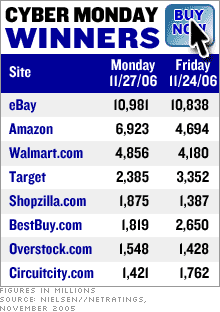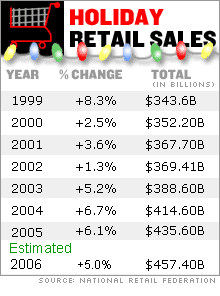Cyber Monday sales hit record $608 millionComScore says online sales jumped 26 percent. How did Wal-Mart and other retailers fare?NEW YORK (CNNMoney.com) -- Total online purchases on Cyber Monday, one of the biggest shopping days for e-tailers, jumped 26 percent to a record $608 million, according to the latest numbers from ComScore Networks. "It [was] the highest single day in retail e-commerce history and the first day ever to break the $600 million threshold," Gian Fulgoni, chairman of comScore Networks, said in a statement.
"While it was certainly an historic achievement, the online holiday shopping season is just beginning to kick into high gear. Having analyzed and reported on online sales for more than five years, we fully expect several days in the coming weeks to eclipse the spending that occurred on Cyber Monday," he said. ComScore's total sales number excludes travel-related Internet spending. During the first 27 days of November, total online retail spending reached $9.48 billion, or a 24 percent increase versus the same period last year, the report said. The firm expects overall holiday-related online spending in November and December to increase 24 percent to $24.3 billion. Separately, online auctioneer eBay was the clear winner among e-tailers who garnered the most traffic on Cyber Monday, according to market research firm Nielsen//NetRatings' Holiday eShopping Index. The report showed Cyber Monday traffic drew a combined total unique audience of 29.5 million from people who shopped online both from home and work. According to the index, eBay (Charts) had 10.9 million unique visitors, followed by Amazon with 6.9 million and Walmart.com with 4.8 million visitors on Cyber Monday. How did brick-and-mortar merchants do? We'll find out Thursday when the biggest national retail chains report their November same-store sales numbers, which also include Black Friday performance. Wall Street looks very closely at same-store sales, defined as sales at stores that are open at least a year, as a key indicator of a retailer's overall health. November is an important month of retailers' fourth quarters since November and December together account for as much as 50 percent of their annual profits and sales. The National Retail Federation anticipates holiday sales will grow 5 percent to $457.4 billion this year, slower than last year's 6.1 percent increase. Thomson Financial Same-Store Sales Estimate Index, which tracks data from 56 retail chains, projects that overall sales are expected to increase 2.7 percent in November, based on analysts' consensus estimates. Wal-Mart (Charts), desperate to inject momentum into its ongoing sales sluggishness, unleashed some of the most aggressive discounts in hot holiday categories, like toys, electronics, food and home appliances. Unfortunately, it didn't work. The world's largest retailer delivered a dismal November sales forecast over the weekend in which the company estimated that monthly sales fell 0.1 percent, which is worse that its initial hopes for sales to come in flat for the period. This would mark only the second time since 1995 that Wal-Mart has reported negative sales, according to the Thomson Financial database. The company posted a 0.6 percent comparable sales decline in April 2005, which it blamed on an Easter calendar shift. Some industry watchers speculate that Wal-Mart's weakness may be isolated to problems with the retailer's own merchandise mix and other Wal-Mart-specific issues and not necessarily a broader sign of consumers reining in their spending habits. Excluding Wal-Mart, sales are forecast to rise a stronger 4.8 percent. That compares with an overall increase of 3.7 percent last November and 3.3 percent sales growth, excluding Wal-Mart. Moreover, retail same-store sales year to date are up 3.8 percent, equal to last year's increase for the same period. Excluding Wal-Mart, sales are up an even better 4.8 percent versus a 4 percent increase last year. Anthony Chan, managing director and chief economist with JPMorgan Private Client Services, cautions against dismissing Wal-Mart's poor numbers. "Given its size and the millions of people of shop there every week, Wal-Mart really depicts what is happening in mainstream America," Chan said. Chan compared the 2006 holiday season to a "tale of two cities. ... The upper end of the retail chain, like Tiffany's, is doing very well while the lower end including Wal-Mart and the dollar stores are struggling," he said. "This trend indicates that while the equity market is doing well, the economy overall is moderating." "But lower energy prices are giving some support to consumer spending. Holiday sales could be a little bit higher than last year but not by much," Chan added. Among the winners in the first leg of the holiday sales race, analysts surveyed by First Call expect Wal-Mart's rivals Target (Charts) and Costco (Charts) did well in November. The high-end space should also be an outperformer, led by strong sales at Nordstrom (Charts) and Saks. J.C. Penney (Charts) and Kohl's are pegged to have had a decent performance last month. In the apparel space, trendy fashion sellers American Eagle Outfitters and Bebe Stores, men's clothing merchant Jos A Bank, and children's clothing sellers Children's Place and Gymboree are among the projected standouts. Wal-Mart unleashes Cyber Monday deals Wal-Mart launches digital movie downloads |
|


